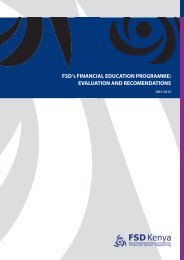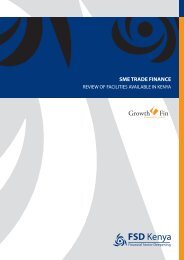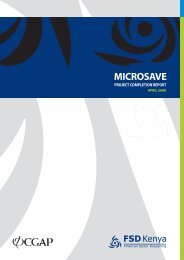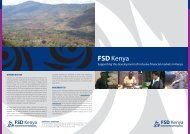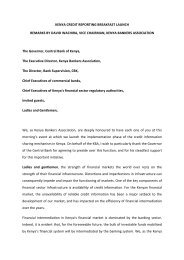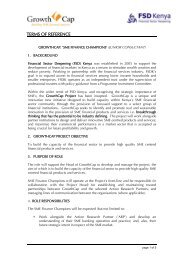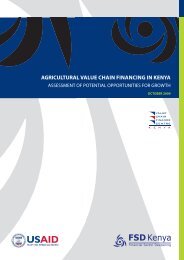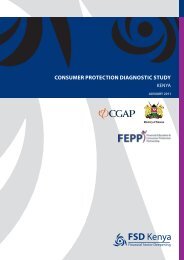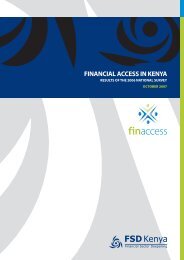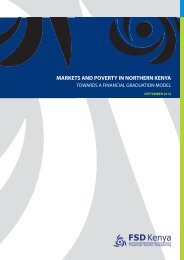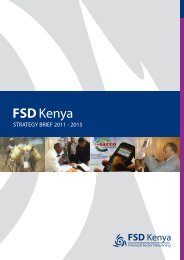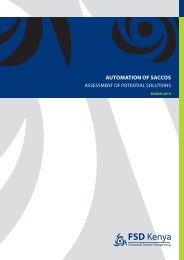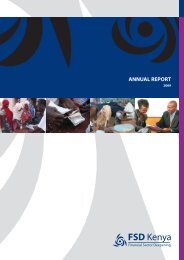FINAL REPORT - FSD Kenya
FINAL REPORT - FSD Kenya
FINAL REPORT - FSD Kenya
You also want an ePaper? Increase the reach of your titles
YUMPU automatically turns print PDFs into web optimized ePapers that Google loves.
In cases emergencies of illnesses respondents go to local dispensaries that are found in each location<br />
but cases arise when the sick are referred to Garissa Hospital and those who do not have animals to<br />
sell cannot raise cash for transport and resort to taking their children to be prayed for by sheiks or use<br />
herbal medicines. The ones with cattle sometimes sell at below market rates to raise quick money for<br />
transport or drugs. Some respondents use the OVC support as a guarantee to borrow or borrow from<br />
relatives or the few money lenders in the communities to raise cash.<br />
iv. Subsistence Farming and Petty Trade<br />
A few of the respondents especially in Balambala undertake subsistence farming along the Tana river<br />
while the rest either sell charcoal and firewood in Garissa and Daadab refugee camp, have petty trade<br />
or hawk milk that they buy from Bangali town (located along Garissa/Mwingi Road) and sell in Garissa<br />
town.<br />
2.4 What are the Demand for Financial Services: Savings, Credit and Money<br />
Transfer<br />
2.4.1 Financial System in Garissa<br />
There are a variety of financial services, formal and<br />
informal, in Garissa District. There are the banks, money<br />
lenders, shopkeepers, rotating savings and credit<br />
associations (RoSCAs), and the Hawillat and buses for<br />
money transfers. All formal institutions i.e. KCB,<br />
PostBank, Posta and Barclays Bank, are located within<br />
Garissa town. Despite the diverse range of providers, the<br />
informal system plays a major role in the delivery of<br />
financial services.<br />
10<br />
The Financial System in Garissa<br />
1. Shopkeeper<br />
2. Money lenders<br />
3. ROSCAs<br />
4. Local money transfer systems<br />
(Hawillat and Buses)<br />
5. PostBank<br />
6. Commercial Banks<br />
2.4.2 Savings<br />
All the respondents save in informal mechanisms including savings in kind, savings at home, RoSCAs<br />
and shopkeepers despite their small incomes mainly because they are faced with expenditure needs that<br />
surpass their regular incomes. None of the respondents studied, even those in Iftin, had savings with a<br />
formal institution.<br />
i. Saving in kind<br />
All respondents reported that the only means of savings is through buying animals (goats, cattle and<br />
camels) and selling them at a later stage when there are cash needs. Savings is mostly done in goats<br />
because not only do they require relatively low amounts of money to buy, but they are also resistant to<br />
drought. Some reported that due to the past severe drought floods, most animals died and now they do<br />
not have the wherewithal to save (in kind). Respondents identified the risks involved in this type of<br />
savings as death of animals and fall in prices when there are crises of floods, drought and emergencies;<br />
and the difficulty in converting animals into cash in cases of emergency.<br />
ii. Saving at home<br />
All respondents reported that they save some cash at home or on themselves (in their wallets) and<br />
move with it as they do their daily chores. They acknowledged that saving at home is extremely<br />
difficult because of the risks and pressures such as theft or careless spending on unplanned activities.



